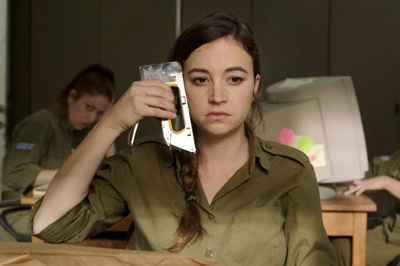Zero Motivation
Permanent link All Posts
Nelly Tagar as Daffi in Zero Motivation
It took me five years to finally get to another screening at the annual Chicago Festival of Israeli Cinema. Talk about Zero Motivation.
In 2009, I made the mistake of going too heavy for my first CFIC experience when I saw Ronit and Shlomi Alkabetz’s Shiva. Zero Motivation proved infinitely more accessible, especially as a young adult. When it stops playing festivals and gets wider distribution (I hope) in the U.S., it’s can’t-miss stuff, especially for young adults who have connected with Israel or Israelis at some point in their lives.
The film focuses primarily on two young women in the IDF who work in the administrative office at a military base in Southern Israel. They are essentially pencil-pushers and coffee-runners put in charge of oddly specific mundane tasks, such as paper-shredding or snail mail. Daffi (Nelly Tagar) dreams of being reassigned to Tel-Aviv, whereas her best friend, Zohar (Dana Ivgy), aspires to set Minesweeper records on all the office PCs and lose her virginity to the next willing soldier. As they try and maneuver around the annoying girls in the office and their rigid commander, Rama (Shani Klein), a few brushes with reality test their friendship to the extreme.

Dana Ivgy (left) and Nelly Tagar play best friends at odds in Zero Motivation.
The best way to describe Talya Lavie’s film to American audiences is to imagine if Juno writer Diablo Cody wrote a movie about the Israeli army starring Girls star Lena Dunham and Ellen Page. Lavie’s script is razor sharp and hilarious, but also a little dark and unsettling. It touches on a couple mature and heavy issues within the context of wit and satire, which though uncomfortable, is the good kind of uncomfortable, and it lends a certain gravity to the movie, which otherwise would be a noteworthy comedy but little more.
Neither Daffi nor Zohar are particularly loveable, but they are easy to identify with. Today’s American 20-year-olds might not have to go through the army, but they know plenty about doing dead-end work, pondering their direction in life and fighting their inclination to merely entertain themselves. That’s a universal sentiment, and what ultimately makes Zero Motivation worthy of its 12 Israeli Film Academy nominations, half of which resulted in wins, including Best Actress for Ivgy.
Balancing out the movie’s delicate fusion of satire and important issues is the friendship dynamic between Daffi and Zohar. It is this grounding, human component that helps the film resonate across cultures and languages. Even though the film is really about them reconciling their own personal desires with their friendship rather than the friendship itself, social dynamics really provide the emotional fuel of the story.
Could Zero Motivation hypothetically be remade in another country such as America, taking place at an office with interns instead of a military base? Perhaps, but the army is a rite of passage that most other countries don’t have, and it’s so formative of the identities of Israeli young adults. Anyone who has spent time with Israelis and met a few whose job in the army was not all that glorious can at least grasp the importance of this setting in Lavie’s film. There’s also clearly a much deeper layer of satire that will only play effectively to Israeli viewers, but you can sense the richness of the dialogue that could be had about the issues presented.
Although not approached head on, there’s an undercurrent that addresses women perceiving their self-worth based on their relationships with men. Anyone can enjoy this movie, of course, but the talking points for women are important ones that again, transcend cultural boundaries, even though there are sure to be nuances.
Films that are genuinely funny, relatable and thought-provoking are rare as it is, let alone when it conveys those things despite being in a foreign language. It’s unfortunate that Zero Motivation won’t be Israel’s submission for the Academy Awards because it would really play well here and probably spark dialogue with regards to the perception of Israel and its military in the West.
Zero Motivation is also a reminder that as the market for independent film grows in the United States, so does our ability to appreciate foreign films. The two go hand in hand. Young adults in Chicago should be aware of the quality of Israeli filmmaking and beret’s off to the Chicago Festival of Israeli Cinema for securing this newer movie for this year’s slate.



.jpg)



